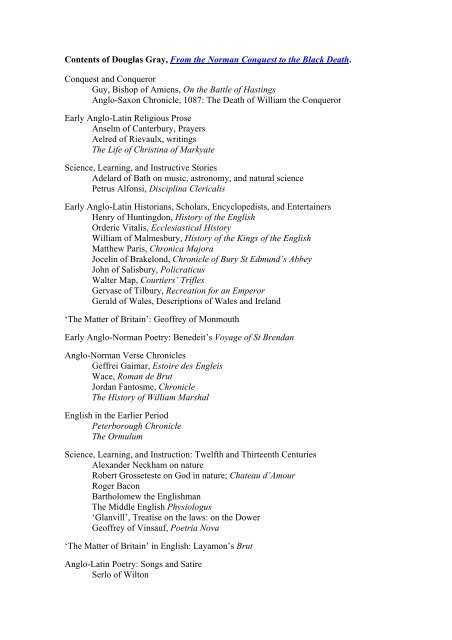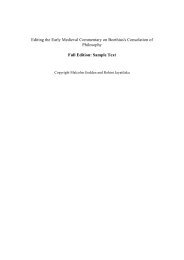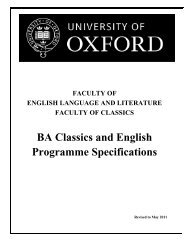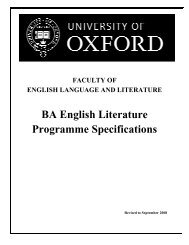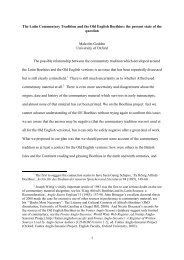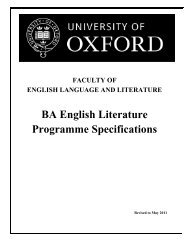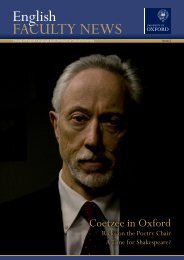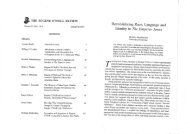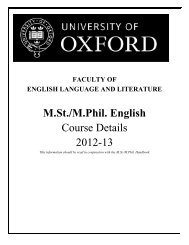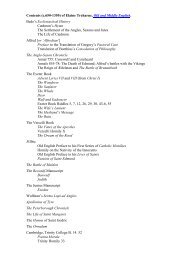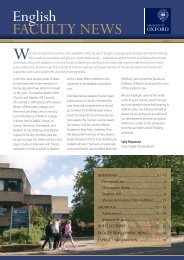Douglas Gray, From the Norman Conquest to the Black Death.
Douglas Gray, From the Norman Conquest to the Black Death.
Douglas Gray, From the Norman Conquest to the Black Death.
Create successful ePaper yourself
Turn your PDF publications into a flip-book with our unique Google optimized e-Paper software.
Contents of <strong>Douglas</strong> <strong>Gray</strong>, <strong>From</strong> <strong>the</strong> <strong>Norman</strong> <strong>Conquest</strong> <strong>to</strong> <strong>the</strong> <strong>Black</strong> <strong>Death</strong>.<br />
<strong>Conquest</strong> and Conqueror<br />
Guy, Bishop of Amiens, On <strong>the</strong> Battle of Hastings<br />
Anglo-Saxon Chronicle, 1087: The <strong>Death</strong> of William <strong>the</strong> Conqueror<br />
Early Anglo-Latin Religious Prose<br />
Anselm of Canterbury, Prayers<br />
Aelred of Rievaulx, writings<br />
The Life of Christina of Markyate<br />
Science, Learning, and Instructive S<strong>to</strong>ries<br />
Adelard of Bath on music, astronomy, and natural science<br />
Petrus Alfonsi, Disciplina Clericalis<br />
Early Anglo-Latin His<strong>to</strong>rians, Scholars, Encyclopedists, and Entertainers<br />
Henry of Huntingdon, His<strong>to</strong>ry of <strong>the</strong> English<br />
Orderic Vitalis, Ecclesiastical His<strong>to</strong>ry<br />
William of Malmesbury, His<strong>to</strong>ry of <strong>the</strong> Kings of <strong>the</strong> English<br />
Mat<strong>the</strong>w Paris, Chronica Majora<br />
Jocelin of Brakelond, Chronicle of Bury St Edmund’s Abbey<br />
John of Salisbury, Policraticus<br />
Walter Map, Courtiers’ Trifles<br />
Gervase of Tilbury, Recreation for an Emperor<br />
Gerald of Wales, Descriptions of Wales and Ireland<br />
‘The Matter of Britain’: Geoffrey of Monmouth<br />
Early Anglo-<strong>Norman</strong> Poetry: Benedeit’s Voyage of St Brendan<br />
Anglo-<strong>Norman</strong> Verse Chronicles<br />
Geffrei Gaimar, Es<strong>to</strong>ire des Engleis<br />
Wace, Roman de Brut<br />
Jordan Fan<strong>to</strong>sme, Chronicle<br />
The His<strong>to</strong>ry of William Marshal<br />
English in <strong>the</strong> Earlier Period<br />
Peterborough Chronicle<br />
The Ormulum<br />
Science, Learning, and Instruction: Twelfth and Thirteenth Centuries<br />
Alexander Neckham on nature<br />
Robert Grosseteste on God in nature; Chateau d’Amour<br />
Roger Bacon<br />
Bartholomew <strong>the</strong> Englishman<br />
The Middle English Physiologus<br />
‘Glanvill’, Treatise on <strong>the</strong> laws: on <strong>the</strong> Dower<br />
Geoffrey of Vinsauf, Poetria Nova<br />
‘The Matter of Britain’ in English: Layamon’s Brut<br />
Anglo-Latin Poetry: Songs and Satire<br />
Serlo of Wil<strong>to</strong>n
Nigel Whiteacre of Canterbury<br />
Peter of Blois<br />
Saints’ Lives and Visions<br />
Denis Piramus: La vie Seint Edmund le Rei<br />
Edward Grim, The <strong>Death</strong> of Thomas Becket<br />
The S<strong>to</strong>ry of Little St Hugh of Lincoln<br />
Adgar’s Miracles of <strong>the</strong> Virgin Mary<br />
The Revelation of <strong>the</strong> Monk of Eynsham<br />
Anglo-<strong>Norman</strong> Romances<br />
Thomas, Horn<br />
Thomas, Tristan<br />
Guillaume le Clerc, Fergus<br />
Boeve de Haum<strong>to</strong>ne<br />
Romances and Outlaw Tales<br />
Fouke le FitzWaryn<br />
Gamelyn<br />
Tales of Antiquity<br />
Joseph of Exeter, Trojan War<br />
The Roman de Toute Chevalerie<br />
King Alisaunder<br />
Short Romances and Lais: Marie de France<br />
Fables and Animal S<strong>to</strong>ries: Marie de France and o<strong>the</strong>rs<br />
Walter <strong>the</strong> Englishman on beasts<br />
Marie de France, Fables<br />
Odo of Cheri<strong>to</strong>n on <strong>the</strong> crow<br />
The Vox and <strong>the</strong> Wolf<br />
Nicholas Bozon, Les contes moralisés<br />
Debate: The Owl and <strong>the</strong> Nightingale<br />
Burlesque, Parody, Merry Tale<br />
Robert Biket, Le Lai du Cor<br />
Dame Sirith<br />
The Land of Cockaygne<br />
Early Middle English Religious Prose: <strong>the</strong> ‘Ka<strong>the</strong>rine Group’, <strong>the</strong> ‘Wooing Group’,<br />
and Ancrene Wisse<br />
Moral and Religious Verse and Prose<br />
Chardri, Le petit plet<br />
La vie des Set Dormanz<br />
Robert de Gretham, Miroir<br />
St Edmund of Abingdon, Mirour de Seinte Eglyse<br />
John Pecham, ‘Philomena praevia’<br />
Judas<br />
Le Regret de Maximian<br />
Thomas of Hales, Love Ron
Nicole Bozon, How <strong>the</strong> Son of God was Armed on <strong>the</strong> Cross<br />
English Romances<br />
King Horn<br />
Floris and Blauncheflur<br />
Havelok<br />
Sir Orfeo<br />
Lyrics, Anglo-<strong>Norman</strong> and Middle English<br />
Drama<br />
Liturgical Drama: Lawrence of Durham<br />
Latin Comedy: Babio<br />
Biblical Drama: The Play of Adam<br />
Dramatic Interlude: The Interludium de clerico et puella<br />
Morality Play: The Pride of Life<br />
Later Chroniclers, Scholars and Theologians<br />
Pierre de Lang<strong>to</strong>ft, Chronicle<br />
Laurence Minot, war poems<br />
Ranulf Higden, Polychronicon<br />
Thomas <strong>Gray</strong>, Scalacronica<br />
John of Fordun on Scotland<br />
Richard of Bury and <strong>the</strong> ‘Classicizing Friars’<br />
Duns Scotus and William of Ockham<br />
English Narrative in <strong>the</strong> earlier Fourteenth Century: Robert Mannyng<br />
Handlyng Synne<br />
Chronicle<br />
Earlier Fourteenth-Century Alliterative Poems<br />
Wynnere and Was<strong>to</strong>ure<br />
Joseph of Arimathie<br />
William of Palerne<br />
Earlier Fourteenth-Century Mystical Writing: Richard Rolle<br />
Private Devotion: Henry of Lancaster’s Le Livre de Seyntz Medicines<br />
Wonders of <strong>the</strong> East: Mandeville’s Travels


